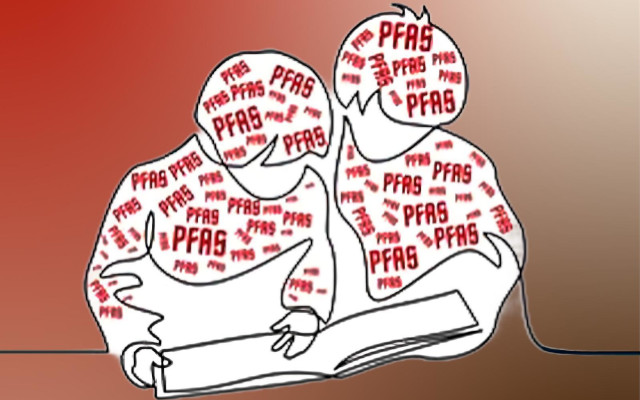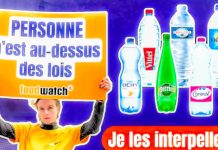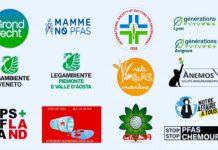The solid investigation ‘The Forever Lobbying Project’ documents the pressures of industrial lobbies to oppose any policy aimed at restricting the use of per- and polyfluoroalkyl substances (PFAS), in the hope of protecting public health. (1)
The European Commission is thus considering providing for broad exemptions in favor of ‘essential’ industrial uses, in the hypothesis of introducing a timid ban on the use of these chemical substances, which are carcinogenic and genotoxic as well as ‘eternal’ (2,3,4). An in-depth analysis, and a petition.
1) ‘Miracle chemicals’, ‘forever chemicals’
The chemical industry began using PFAS on a large scale at the beginning of the 50s, to produce materials and objects intended for both mass consumption and numerous industrial uses. Food contact materials (i.e Teflon, containers), waterproof fabrics, but also pesticides (eg pesticides, herbicides), semiconductors, electronics, turbines, fire-fighting foams, paints, furniture, cosmetics, etc.

Source: https://www.aces.su.se/events/aces-seminar-series-panel-discussion-on-pfas-and-the-essential-use-concept/
These substances – today developed in over 10.000 compounds, in about 200 categories of use (5) – were celebrated as ‘miracle chemicals’, thanks to their exceptional chemical properties that guarantee their resistance to water and humidity, heat, grease and stains. And these same properties have then revealed their nature as ‘forever chemicals’, since their degradation in the environment requires up to a thousand years. (6)
2) ‘The poison of the century’
The academic research of then secret documents from the chemical industry (Gaber et al., 2010) ‘shows that companies knew that PFAS were highly toxic when inhaled and moderately toxic when ingested as early as 1970, forty years before the public health community’. (7)
3M knew that PFAS have been binding to blood since 1950; a Stanford University study confirmed their presence in human blood in 1956; in 1961 Dupont toxicologists associated exposure to PFAS with increased liver and kidney size in animal models; in 1962 ‘polymer fume fever’ was found in volunteers who smoked cigarettes wrapped in paper treated in this way; in the years that followed, scientists documented ‘acute oral toxicity’, damage to the liver, kidneys, spleen, immune system; eye defects in the fetuses of female workers; tumors. (8)
‘The industry has used several strategies that have been shown to be common to the tobacco, pharmaceutical, and other industries to influence science and regulation. In particular, suppressing unfavorable research and distorting public discourse’. (7)
3) Legal actions
In the last 25 years, 3M and DuPont have faced more than 15.000 lawsuits and paid more than $11 billion in settlements and awards to governments and water companies in the U.S. In 2017, DuPont paid more than $600 million to settle more than 3.550 lawsuits. And 3M still faces nearly 4.000 lawsuits, alleging PFAS pollution and damage.
‘When we find PFAS in water, soil, air, people, we can trace the small core of companies that created these chemicals. We know who is responsible’ – explained Robert Bilott, one of the first lawyers involved in these battles (9) – for a simple reason. ‘These substances are always produced by man, they do not exist in nature’.
A new wave of legal actions could finally also hit the industries based in the European Union and their top executives, it is worth adding, for environmental crimes with serious impact on public health. (10)
4) Environmental disaster
Forever Pollution Project – the cross-border collaborative survey launched in 2023 by 29 media partners in 16 European countries, with the collaboration of Corporate Europe Observatory (11) – has identified, in Europe alone:
- 20 PFAS production facilities
- 23,000 sites contaminated by PFAS, of which
- 2,100 sites with high levels of contamination (‘PFAS hotspots’)
- another 21,500 sites at risk, due to past and/or current industrial activities.

5) PFAS in drinking water and food
Pesticides, herbicides and fungicides are indicated as the main causes of the presence of molecules of the PFAS group (i.e. TFA) in soil and drinking water, non-organic fruit and vegetables, and foods of animal origin (12,13,14). The contamination of drinking water – also due to the presence of PFAS in rains, for various reasons, from the Arctic to Tibet (15) – is systemic. As confirmed, among other things, by recent tests conducted in Switzerland. (13)
‘Waters without Poisons’ – the investigation conducted by Greenpeace on 260 samples of drinking water collected in 235 municipalities, in all regions of Italy, between September and October 2024 – detected the presence of PFAS in 79% of cases. (16) The researchers, it should be noted, analyzed 58 molecules. That is, more than double the mere 24 that the European Commission recommends Member States to monitor (17,18).
6) Health disaster
A recent study of the University of Padua has detected a significant increase in cases of premature mortality due to cardiovascular diseases and tumors (testicular and renal, in particular) in the population living in an area of 190 km2, in Veneto (North-East Italy), exposed for over thirty years to PFAS pollution from a fluorochemical industry. (19)
The scientific literature is, after all, well established in associating human exposure to PFAS group substances with a wide range of health harms:
– reduced fertility, gestational diabetes and pregnancy-induced hypertension
– birth defects and developmental delays, allergies and asthma in children, osteoporosis at a young age
– damage to the immune, endocrine, neurological, hepatic systems, insulin resistance
– tumors, genetic alterations.
7) Environmental cleanup, trillion costs
Researchers involved in the project ‘The Forever Lobbying Project’ – Ali Ling (University of St. Thomas, USA, Faculty of Engineering) and Hans Peter Arp (Norwegian University of Science and Technology and Norwegian Geotechnical Institute) – estimate that:
– the costs of environmental cleanup from current PFAS pollution, including emerging PFAS, in Europe alone may exceed €2 trillion over the next 20 years (€100 billion/year);
– priority interventions must concern the remediation of sites with the highest concentrations of long-chain PFAS, with an investment of 4,8 billion euros per year;
– these costs are destined to increase, even significantly, if industries continue to produce and use ‘forever chemicals’. Their ban is therefore urgent. (20)
8) European Commission, European Chemical Agency
The European Commission – always sensitive, to put it mildly, to financial and big industry lobbies – has deliberately excluded the introduction of legal thresholds for the presence of PFAS both in the recent revision of the Drinking Water Directive (EU) 2184/2020, (21) both in general food. (17) With the sole exception of the limits established for four substances (PFOS, PFOA, PFNA, PFHxS, and their sum) on eggs, meat, fish, crustaceans, molluscs and offal. (14)
Only thanks to the initiative of five member countries – Denmark, Germany, the Netherlands, Norway and Sweden, which on 13 January 2023 submitted a proposal for a revision of the REACH (Registration, Evaluation, and Authorization of Chemical Substances) Regulation (EC) 1907/2006 – ECHA (European Chemical Agency) had to consider the possibility of introducing restrictions on the use of PFAS. Entrusting this assessment not only to risk analysis, but also to socio-economic analysis. (22)
9) Brussels, toxic horizon
‘We know that we are trying to ban the use of PFAS in consumer products’, said European Environment Commissioner Jessika Roswall in an interview with Reuters. ‘This is important for us humans, of course, but also for the environment and I think also for the industry, so that it knows how to phase out PFAS’. (2)
The horizon is toxic, as much as the present and the past. Beyond the empty words of the Commissioner, the following is noted:
– October 14, 2020 the first von der Leyen Commission had already promised a systematic reform of the REACH regulation, in the EU ‘Chemicals Strategy for Sustainability: Towards a Toxic-free Environment’. With the prospect of banning PVC, PFAS, flame retardants, parabens and other toxic chemicals, between 5.000 and 7.000 poisons in total, by 2030;
– April 25, 2022 Commission then presented a ‘restriction roadmap’ where the aforementioned commitments were postponed to the last quarter of 2023 (23,24). In that same period, ECHA’s assessment of the hypothesis of restrictions on the use of PFAS (proposed by five Member States, and not by the Commission) was paralysed by the collection of more than 5.600 comments, mostly from the industrial sector; (25)
– the only restriction on the use of PFAS introduced so far, with a transitional period of five years, concerned only one substance of the group, PFHxA. (26) The Commission has reneged on the commitments it had made both in the ‘Chemicals Strategy’ and in the ‘Farm to Fork Strategy’. To the point of withdrawing the SUR (Sustainable Use and reduction of pesticides Regulation) proposal, after the disputed renewal of the authorisation for glyphosate (27,28,29).
10) Industrial Lobbies, secrets revealed
‘The Forever Lobbying Project’ – the investigative report published on January 14, 2025, in the wake of the ‘Forever Pollution Project’ – is based on over 14,000 unpublished documents on ‘forever chemicals’, also obtained thanks to 184 requests for access to documents, now made public online and stored in the Industry Documents Library of the University of California (San Francisco, USA). (30)
Industrial lobbies are driven by the plastics industry, with the support of industry trade associations CEFIC and Plastics Europe, batteries and semiconductors, medical technology and pharmaceuticals, and other manufacturing sectors. ‘Collectively, the largest PFAS producing companies have seen an average increase in reported spending on the EU lobby of 34% in the last year alone.’ (31,1).
11) ‘Merchants of doubts’
A team of 18 international academics and lawyers from Zurich, Stockholm, Toronto, Rotterdam and elsewhere, experts in environmental chemistry and criminology – with the support of Gary Fooks (University of Bristol, UK) – has developed a ‘stress test’ method for the critical analysis of the arguments put forward by industrial lobbies in support of ‘business as usual’. (1)
The poison industries use consultancy, lobby and communication firms to finance ‘impact assessments’ and other studies favorable to the sector; promote soft ‘self-regulation’ initiatives in opposition to severe rules; cultivate doubts about the scientific evidence of environmental and health disasters caused by these substances.
The key topics of the sector lobbies ‘are alarmist, false, misleading or potentially dishonest. The investigation details how industry lobbyists employ corporate influence tactics used over decades to defend tobacco, fossil fuels and other chemicals and pesticides. The public debate over PFAS has now been tainted by these ‘merchants of doubts’. (1)
12) Competitiveness and poisons in the EU. The Draghi report
The recommendations contained in the report on competitiveness in the EU signed by the former president of the ECB (European Central Bank) Mario Draghi, it is worth adding, include some references to PFAS which not coincidentally coincide with the positions of the poison industries:
– ‘EU legislation’s risk assessment is not always based on actual exposure, placing additional constraints on products and processes. The PFAS regulation, for example, bans 10.000 substances, but is at the same time difficult to enforce for imported products, also due to a lack of laboratory capacity (distorting the level playing field).’;
– ‘a possible upcoming ban on a number of PFAS substances would have an impact on the use of substances needed to produce clean technologies (batteries and electrolysers), for which there are currently no alternatives. A possible ban on a number of PFAS substances could also have an impact on the European industry of refrigerants used in heat pumps (…)’. (32)
13) Free the EU from toxic substances! Petition
Corporate Europe Observatory – in addition to having actively participated in ‘The Forever Lobbying Project’ (33) – has launched the following petition, to be sent to the European Commission, the European Parliament and the Heads of State of the EU:
– ‘We call on you to commit to a toxic-free Europe and to give urgent priority to the fight against toxic chemicals in our ecosystems, air, water and human bodies;
– we call for the full implementation of the European Union’s promises in its Chemicals Sustainability Strategy, to ensure a toxic-free Europe by 2030;
– particular attention must be paid to the systematic reform of the REACH Regulation, in order to ensure the rapid ban of the most harmful chemicals in consumer products;
– insist on the full implementation of the EU action plan to phase out PFAS and support negotiations for their universal ban. These substances must nevertheless be banned in sectoral legislation, such as toys, cosmetics, packaging and food contact materials;
– we also call for assistance to communities affected by ongoing chemical pollution and ensure thorough monitoring, land remediation, health and other plans in response to their needs;
– finally, the full responsibility of PFAS producers and associated companies is affirmed’.
The petition can be signed on the Corporate Europe Observatory website, at the link https://tinyurl.com/3824nbup.
#Égalité
Dario Dongo
Footnotes
(1) The Forever Lobbying Project https://tinyurl.com/fkkn42zs
(2) Marta Strinati. PFAS substances are carcinogenic, IARC confirms. FT (Food Times). December 3, 2023
(3) See lastly Logan Running et al. Investigating the Mechanism of Neurotoxic Effects of PFAS in Differentiated Neuronal Cells through Transcriptomics and Lipidomics Analysis. ACS Chem. Neurosci. 2024, 15, 24, 4568-4579 https://doi.org/10.1021/acschemneuro.4c00652
(4) Kate Abnett. EU plans ban on ‘forever chemicals’ in consumer products. Reuters. January 20, 2025 https://tinyurl.com/3etpze2c
(5) Glüge J et al. An overview of the uses of per- and polyfluoroalkyl substances (PFAS). Environ Sci Process Impacts. 2020 Dec 1;22(12):2345-2373. doi: 10.1039/d0em00291g
(6) CS-C. Liou et al. Investigating the biodegradability of perfluorooctanoic acid. Chemosphere. Volume 8, Issue 2, June 2010, pages 176-183. https://doi.org/10.1016/j.chemosphere.2010.03.009
(7) Gaber N, Bero L, Woodruff TJ. The Devil they Knew: Chemical Documents Analysis of Industry Influence on PFAS Science. Ann Glob Health. 2023 Jun 1;89(1):37. doi: 10.5334/aogh.4013
(8) Ewg (2019). For 50 Years, Polluters Knew PFAS Chemicals Were Dangerous
But Hid Risks From Public https://tinyurl.com/5ptt4v2d
(9) Sarah Pilz, Craig Shaw. The poison of the century. The Black Sea. January 14, 2025 https://tinyurl.com/44p2ppfp
(10) Dario Dongo, Alessandra Mei. Environmental crimes, the new EU directive. FT (Food Times). March 7, 2024
(11) The Forever pollution project. Journalists tracking PFAS across Europe https://foreverpollution.eu
(12) Dario Dongo. TFA, PFAS. From pesticides to drinking water. FT (FoodTimes). October 17, 2024
(13) Marta Strinati. PFAS in non-organic fruits and vegetables through pesticides. PAN Europe study. FT (Food Times). February 26, 2024
(14) Marta Strinati. PFAS, go for limits in meat, fish, eggs and other foods of animal origin. FT (FoodTimes). January 20, 2023
(15) Marta Strinati, Dario Dongo. PFAS in rainwater and food, global ban urgently needed. FT (FoodTimes). August 26, 2022
(16) Giuseppe Ungherese. PFAS: our analyses on drinking water reveal worrying data in all the Regions of Italy. Greenpeace Italy. 22.1.25 https://tinyurl.com/5euf2726
(17) See paragraph 4 of the previous article by Dario Dongo, Andrea Adelmo Della Penna. PFAS, furans, glycoalkaloids, Alternaria. European Commission ‘recommends’ rather than bans. FT (FoodTimes). September 23, 2022
(18) Dario Dongo. PFAS and microplastics, EU guidelines for monitoring and analysis of drinking water. FT (FoodTimes). August 30, 2024
(19) Marta Strinati, Ylenia Desireè Patti Giammello. PFAS pollution, almost four thousand more deaths in 30 Veneto municipalities. GIFT (Great Italian Food Trade).
(20) Unaffordable. The absurd cost of ‘PFAS as usual’. Forever Pollution Project https://tinyurl.com/32y87288
(21) Dario Dongo, Ylenia Desire and Patti Giammello. Drinking water, the universal right and the EU directive. FT (FoodTimes). July 9, 2021
(22) Dario Dongo. PFAS. Restriction on EU use of forever chemicals under consideration by ECHA. FT (FoodTimes). February 23, 2023
(23) Marta Strinati. Hazardous chemicals, the European Commission’s Restrictions Roadmap. FT (FoodTimes). May 3, 2022
(24) Alessandra Mei. Postponed approval of changes to REACH. The chemical lobby can rejoice. FT (FoodTimes). October 26, 2022
(25) ECHA receives more than 5 600 comments on PFAS restriction proposal. THROW. Press release, 23 September 2023 https://tinyurl.com/8ezm2ccw
(26) Dario Dongo, Paolo Rebolini. PFAS, restrictions on the use of PFHxA in the European Union. FT (FoodTimes).
(27) Dario Dongo. Protesting farmers, pesticides instead of #fairprice. FT (FoodTimes). February 7, 2024
(28) Dario Dongo. No to reducing pesticides, yes to glyphosate. Toxic Europe. FT (FoodTimes). November 23, 2023
(29) Dario Dongo. Glyphosate, the case at the EU Court of Justice. FT (FoodTimes). December 12, 2024
(30) Industry Corporate Library, University of California (San Francisco, USA) https://tinyurl.com/frttubzt. The documents are also kept by Columbia University and the City University of New York, among the ‘Toxic Docs’ https://tinyurl.com/yc368cp3
(31) The Chemour Company, established in 2015 as a spin-off of Dupont, doubled its lobbying spending in the EU in 2024. Its shareholders, 70,3% of which are in US hands, include BlackRock (10,6%), Vanguard (10,1%), JP Morgan (2,1% and Geode (1,7%). Source Market Screener (https://tinyurl.com/5yu4dutm)
(32) See pages 101 and 129 in the report ‘The future of European competitiveness – In-depth analysis and recommendations’. September 9, 2024 https://tinyurl.com/rbunw2ey
(33) Chemical reaction: Inside the corporate fight against the EU’s PFAS restriction. Corporate Europe Observatory. January 2025 https://tinyurl.com/446we88x
Dario Dongo, lawyer and journalist, PhD in international food law, founder of WIISE (FARE - GIFT - Food Times) and Égalité.








